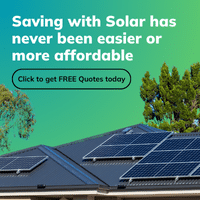Western Australia is experiencing significant growth in solar energy, with approximately 3,000 homes installing solar panels each month. As of 2024, over 400,000 homes and businesses are equipped with solar. This makes rooftop solar the largest cumulative generator in the state.
With the rise in solar panel installations, Western Australians are enjoying reduced electricity bills and a smaller carbon footprint. Many new installations are also incorporating battery systems, enabling households to harness solar energy more effectively, reduce reliance on the grid, and support a sustainable future.
Energy Matters provides free solar quotes, helping individuals find the best deals on solar installation WA. With strong government support and a commitment to clean energy, investing in solar panels in WA is a smart, long-term choice for both homeowners and businesses.
For more information about solar panel installation in Western Australia, or to find a reputable solar installer in WA, request FREE quotes today.
Get Solar Quotes from up to 3 Local Installers in WA
Step 1: Complete our simple quote form to connect with reliable solar installers in Western Australia.
Step 2: Expect to hear from up to three local installers via phone or email, who will share detailed information and their best offers.
Step 3: Evaluate quotes at no cost and with no obligations—select the option that best suits your needs and budget.

Read more about solar panels and other renewable energy technology in Perth.
On this page
Is Investing in Solar Panels Worth It? Explore Your Savings Opportunities
Solar panels are a smart investment for Western Australian residents in 2024. Homeowners can save an average of $450 annually on their energy bills by switching from traditional power sources to solar. Recent government initiatives, such as the Kimberley Communities Solar Saver program, aim to install rooftop solar in remote communities, enhancing access to affordable energy.
With the declining costs of solar technology and the availability of government incentives, many residents are seizing the opportunity to reduce their energy expenses. Whether you’re in Perth or regional areas, there are excellent solar deals waiting for you. Get your free solar quotes today at Energy Matters.
How much do solar panels cost in WA?
The cost of installing solar panels in WA varies depending on system size, installation complexity, and brand choice. As of October 2024, homeowners in WA can expect to pay around $4,170 for a 4kW system, $4,480 for a 5kW system, $5,440 for a 6kW system, $6,360 for a 7kW system, and $9,650 for a 10kW system. These prices include standard installation, the STC discount, and GST. Larger systems generally provide greater long-term savings, especially for households with higher energy consumption.
The chart below outlines the typical costs for various solar system sizes in the WA, giving a clear understanding of current market rates.
Figures are accurate as of October 2024. Source: Solar Choice – October 2024 solar price index. Your solar system price will vary according to your location, installer, products, and any deals or discounts provided by your retailer. All prices are to be used as a guide.
“Today, Energy Matters recommended retailer installed my solar system, and I have no complaints. The crew handled every step of this installation with maximum professionalism. They were incredibly instructed and managed any concerns I had regarding this purchase. The entire process was really easy, from getting a quote to showing up on time and setting up a time that worked for me.”
Hendrix
“I was very happy with my previous solar panel installation, so I went back to Energy Matters to have a new battery installed. Now the system is working to pay me back! Great service from the team, high-quality installation and good price. I’m recommending Energy Matters to my friends.”
Sara
“I would recommend Energy Matters if you are looking to install a solar system for your company. I was surprised by the skill displayed by such young electricians when the company Energy Matters referred to us put a significant number of panels on our two-story building in a short amount of time. The guys always ensured that there would be no disruptions to the business and always tidied up after themselves. Great job and many thanks.”
Edison
WA solar panels: An investment with great returns
For a 6.6 kW solar system in Western Australia, homeowners can expect to save between $1,000 and $1,500 annually, depending on their electricity usage and whether they include battery storage. This estimate is based on the current feed-in tariff (FiT), which varies from 8 to 15 cents per kilowatt-hour (kWh).
For larger systems, such as a 10 kW solar setup, annual savings can reach up to $2,700, especially for households with higher self-consumption rates or those on time-of-use tariffs. These savings highlight the financial benefits of investing in solar energy for homes across Western Australia.
By leveraging available government incentives and the growing affordability of solar technology, residents can make a wise investment in their energy future.
WA rebates and incentives
WA residents and businesses can benefit from several state and federal incentives and rebates, including:
- Small-scale Technology Certificates (for residential and small to medium businesses)
- Feed-in Tariffs
- WA Residential Battery Scheme (commencing 1 July 2025)
- Distributed Energy Buyback Scheme (DEBS)
Discover more about these programs and initiatives through the button below.
Energy efficient products and upgrades
Upgrade your outdated appliances to the latest energy-efficient technology to save significantly on energy costs. Older systems, like hot water heaters, heating and cooling units, and other household devices, may be costing you thousands each year. By replacing them, you can reduce your environmental impact while enhancing your home’s efficiency.
In Western Australia, installing a solar hot water system can save households between $300 and $800 annually on energy bills, depending on hot water usage and the system’s type. These systems harness solar energy to heat water, decreasing reliance on traditional electricity or gas sources, and making them both cost-effective and environmentally friendly.
Western Australian residents can benefit from various incentives, including Energy Ahead, which offers support for upgrading to energy-efficient products for residents experiencing financial hardship.
WA solar batteries: The future of renewable energy
In Western Australia, 25% of all new solar systems installed in 2024 included battery storage. Adding a battery to your solar setup allows you to enjoy power savings around the clock. Not only do solar panels and batteries enhance your home’s value, but they also significantly reduce energy bills and increase your energy independence from the grid.
Batteries are regarded as the future of energy, enabling you to store solar power generated during the day for use at night or on cloudy days when sunlight is limited. Incorporating a battery with a residential solar system can potentially double your self-consumption of generated electricity.
To maximise your battery’s potential, consider joining a Virtual Power Plant (VPP). This initiative can shorten the payback period for your battery investment and provide additional income by selling your stored energy back to the grid during peak demand periods. To learn more about the Origin Loop VPP, visit our page.
WA Battery Rebate: Residential Battery Scheme
The Western Australian Government is launching the WA Residential Battery Scheme to help households install home battery systems. This initiative aims to reduce energy bills, support local jobs, and boost renewable energy use.
What is the scheme?
Starting on or before 1 July 2025, the scheme offers rebates and no-interest loans for installing home batteries. It complements the Federal Government’s Cheaper Home Batteries Program, providing combined support of up to $5,000 for Synergy customers and $7,500 for Horizon Power customers.
Who is eligible?
To qualify, you must:
Own a residential property in Western Australia.
Have an electricity account with Synergy or Horizon Power.
Not be a government, financial, telecommunications, or mining entity.
Agree to participate in a Virtual Power Plant (VPP).
Install an approved battery system after the scheme’s commencement.
Households earning less than $210,000 annually can access no-interest loans up to $10,000, repayable over 10 years. These loans can cover batteries, inverters, and solar panels, provided they’re installed with a battery.
How much can you get?
Rebates are based on battery capacity
Synergy customers: $130 per kWh, up to $1,300.
Horizon Power customers: $380 per kWh, up to $3,800.
Combined with federal support, total rebates can reach $5,000 for Synergy and $7,500 for Horizon Power customers.
This scheme is part of a $337 million investment to make home batteries more accessible, aiming to benefit up to 100,000 households.
The Electric Vehicle (EV) movement is rapidly expanding in Australia. Are you prepared for the shift to electric?
Did you know that about 50% of Western Australians are considering purchasing an electric vehicle (EV) within the next five years? Installing a home battery not only enables you to charge your EV overnight but also allows you to sell any excess stored electricity back to the grid. This flexibility lets you choose the best option for your needs, tailored to your lifestyle and the current feed-in tariff.
With residential EV charging, you can transform your home into a personal charging station, significantly lowering your vehicle costs and enhancing your convenience. The expanding EV market in Western Australia, where EVs made up approximately 7.4% of all vehicle sales in 2022, indicates a positive shift towards sustainable transport options
Now is an excellent time to explore how solar and battery solutions can boost your energy independence while supporting the transition to electric vehicles.
Making solar simple
We understand that concerns about potential complications can deter many from considering solar energy. At Energy Matters, our partners specialise in crafting personalised solutions that meet your unique needs, providing support throughout the entire process. Whether you’re located in Western Australia or elsewhere, you can effortlessly request up to three quotes from reliable local installers. They will work with you to discuss your needs and address any questions you may have regarding the transition to solar energy.
Take the time to explore your options today and embark on the journey toward a more sustainable future!
WA solar and battery FAQs
Western Australia offers various incentives, including the Small-scale Technology Certificate (STC) scheme, which provides a rebate on solar system costs, and the Renewable Energy Buyback Scheme (REBS), allowing homeowners to sell excess solar energy back to the grid.
From 1 July 2025, WA residents will be able to access the WA Battery Incentive along with the federal government Cheap Home Batteries Program.
Homeowners in WA can save significantly on energy bills, with average annual savings ranging from $1,200 to $1,500 for a typical 6.6kW solar system, depending on electricity usage.
The feed-in tariff (FiT) varies, but it typically ranges from 8 to 15 cents per kilowatt-hour (kWh) for surplus electricity fed back into the grid. Check out our rebates and incentives page for the latest FiTs.
While not mandatory, adding battery storage can enhance energy independence, allowing you to use solar power even at night and maximise savings
The installation process generally takes one to three days, depending on the system size and complexity.
Monocrystalline panels are often recommended for WA due to their efficiency and better performance in high temperatures.
Yes, but you’ll need to consult your strata management for approval. Community solar initiatives may also be an option.
Solar panels typically require minimal maintenance. Regular cleaning and an annual inspection are recommended to ensure optimal performance.
WA news and updates
Keep up to date with the latest renewable news and updates from Western Australia.










































